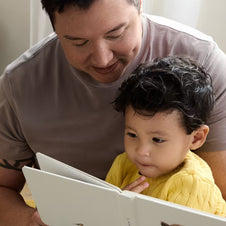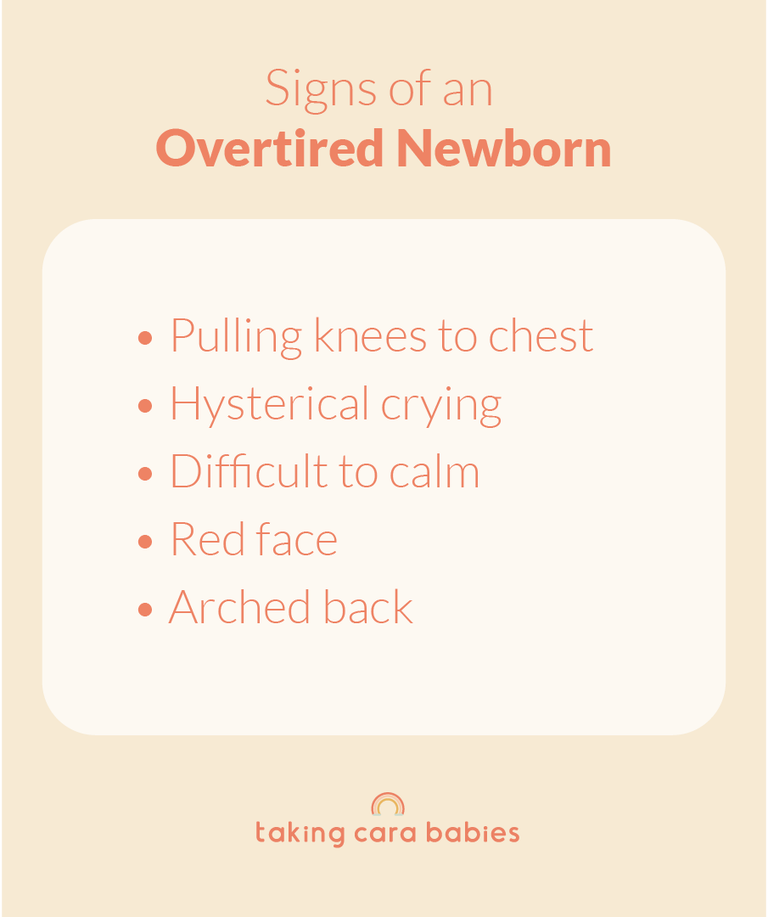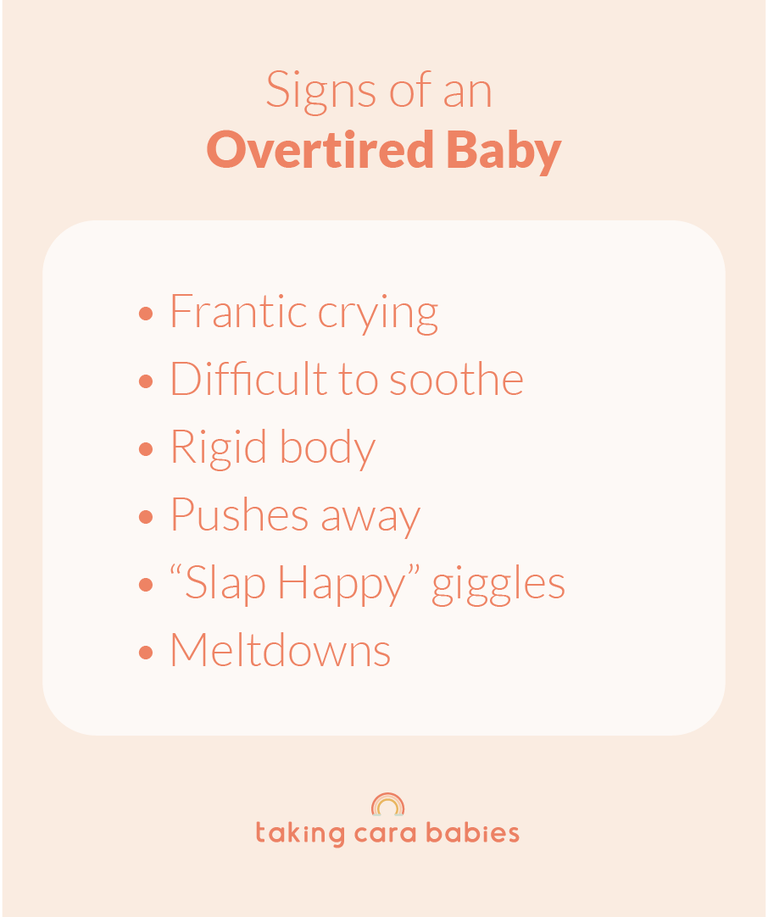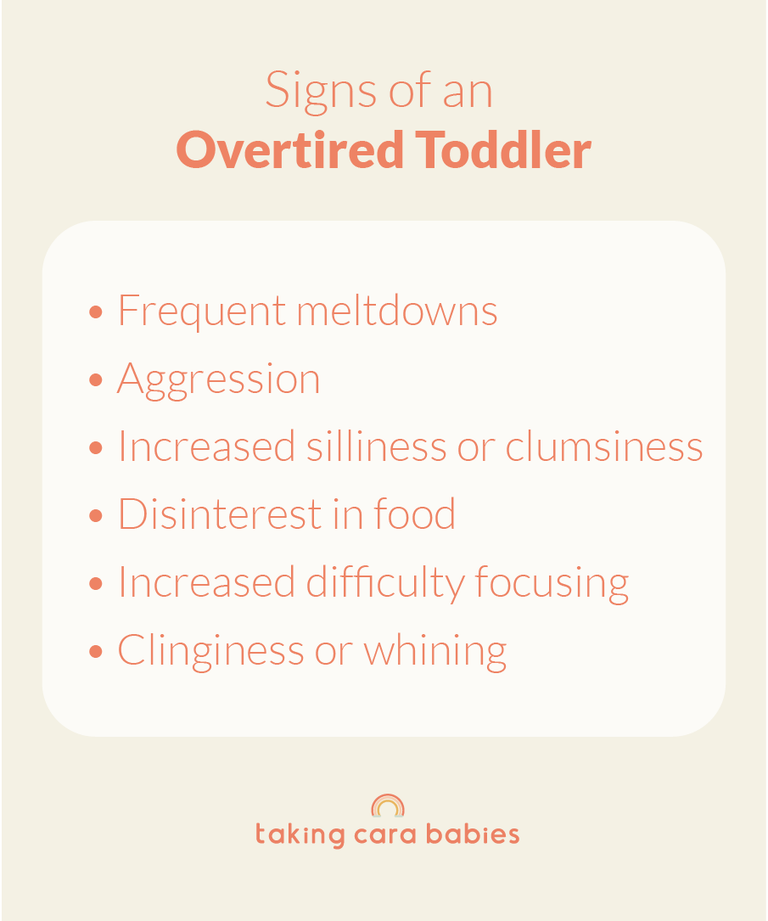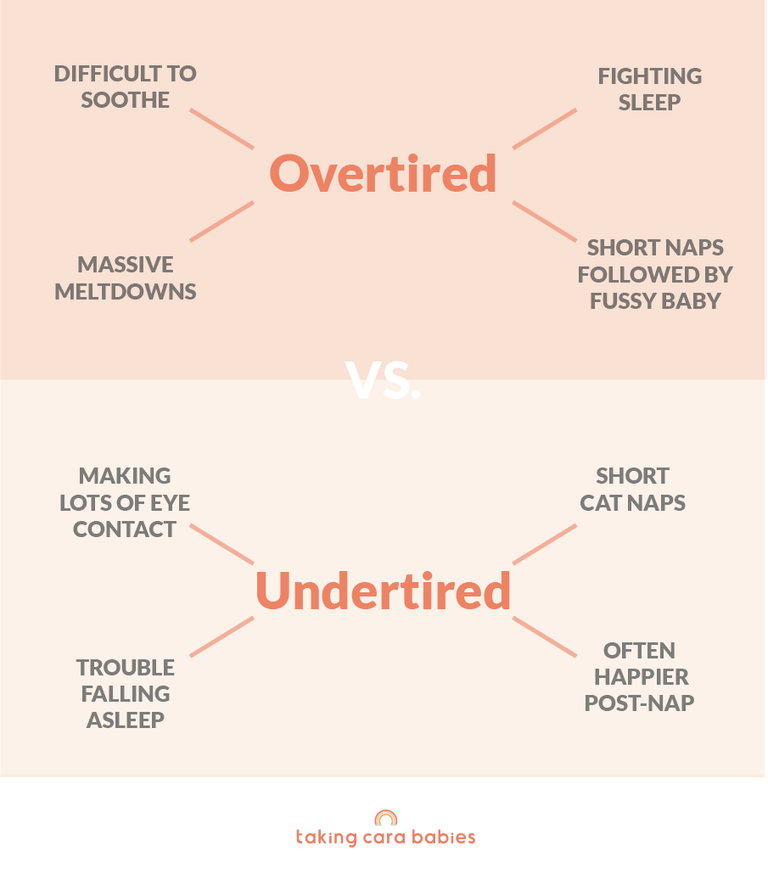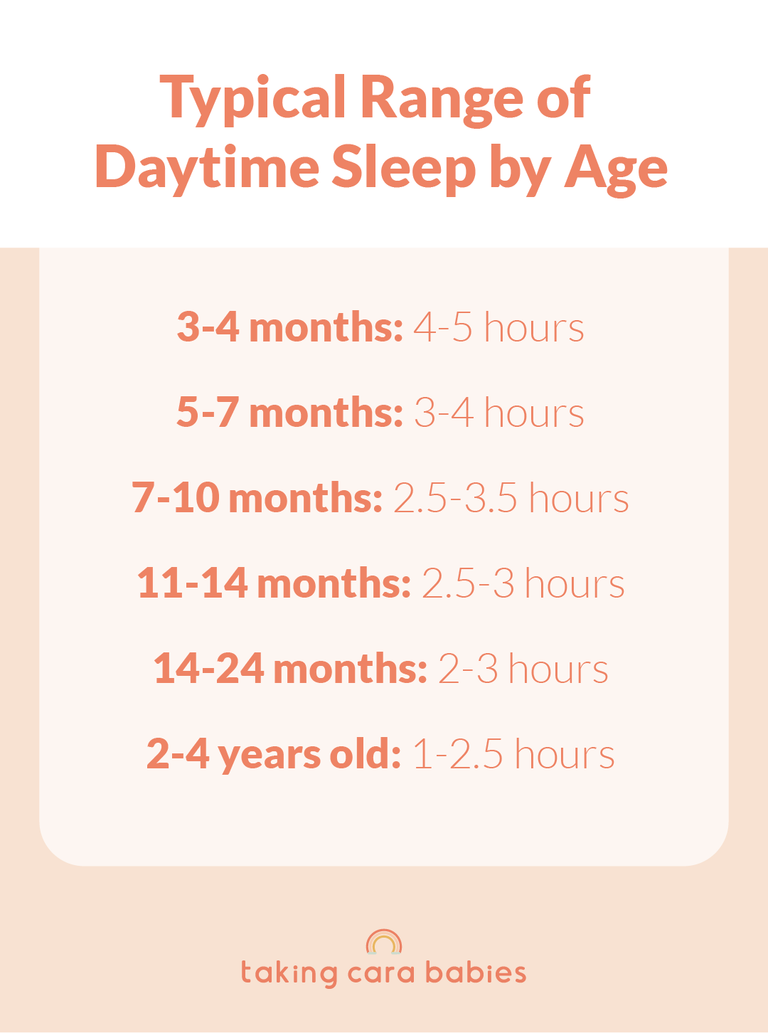Do you have an overtired baby or toddler? Maybe you aren’t sure if your baby is overtired or you’re wondering what “overtired” even means. Let’s talk about signs your baby is overtired, why an overtired baby or toddler won’t sleep, how to get an overtired baby to sleep, and more.
Taking Cara Babies Classes
Why won’t my overtired baby sleep?
When a little one is overtired, cortisol and adrenaline (stress hormones) are released into the bloodstream.(1) This essentially puts a baby in fight-or-flight mode which can make it very difficult for a baby to be soothed to sleep. Instead of being calm or sleepy, a baby or toddler can get a second wind and/or enter into meltdown mode. This can look like:
-
Taking a long time to fall asleep or fighting sleep
-
Taking short naps
-
Waking frequently during a nap or in the middle of the night
-
Waking up screaming or crying even after getting some sleep
Expert Tip: If sleep is a struggle for your little one, my classes can help. I’ll teach you how to set your days and nights up for success to avoid the overtired cycle and work towards great sleep, whether you have a newborn (0-4 months), baby (5-24 months), or toddler (2-4 years).
What are some signs of an overtired baby?
Here are common signs of overtiredness for newborns, babies, and toddlers:
(Scroll to see the different signs!)
Keep in mind: Your baby or toddler may only show a few of these signs of overtiredness. It’s also possible that the signs may look different depending on the day.
How can I tell if my baby is overtired vs. undertired?
It can be tricky to tell the difference between an overtired and undertired baby. Let me explain.
A baby who is overtired may have trouble falling asleep. Shouldn’t babies or toddlers who are really tired fall asleep easily? Unfortunately, that’s not the case. I know it doesn’t make logical sense, but it’s biologically true. (When little ones get overtired, it actually sends their body into a fight-or-flight state, making sleep very difficult.) Following your little one’s cues and age-appropriate wake windows can prevent overtiredness by helping you find your baby’s sweet spot for good sleep.
A baby who is undertired will also have trouble falling asleep because they simply aren't tired enough. This typically looks like a newborn contentedly laying awake in the bassinet, a baby rolling around in the crib, or a toddler singing or talking to themselves in bed. Your little one may also take short naps or wake often during sleep but will likely be content during these wakings. To help avoid an undertired baby or toddler, aim for age-appropriate wake windows and active awake time.
Here’s what to look for if you are wondering if your baby or toddler is overtired or undertired.
How can I prevent an overtired baby?
The best way to prevent an overtired little one is to have the tools and confidence to navigate the big picture of baby sleep. All of my classes are holistic—they look at your baby as a whole child— their physical, emotional, and cognitive needs.
My no-cry Newborn Sleep Bundle (0-4 months) will teach you everything you need to know to set your days and nights up for success— yes, including how to avoid an overtired newborn.
If you need a plan for getting restorative sleep for your baby (5-24 months) or toddler (2-4 years), my classes will help. I’ll teach you how to set your days and nights up for success to avoid the overtired cycle and help your little one learn the skill of sleeping independently.
Will an overtired baby eventually sleep?
The short answer: Yes. But, when a little one is overtired, they’re more likely to fight sleep and sleep is typically more disrupted. Keep reading for tips on how to help your little one fall asleep.
What to do when your baby is overtired:
Sometimes, even with the best intentions, even when we’re watching their cues, even when we’re doing everything “right,” our little ones become overtired.
My best advice for when this happens: Take the focus off of sleep.
Yes, you read that correctly. Instead of focusing on sleep, try to focus on helping your little one to calm down and relax. Here are a few tips to help soothe your baby (and yourself):
1. Go to a quiet room: Perhaps this is the nursery, a back room, or even a walk-in closet; just a place for you and your little one to take a break from all the action.
2. Turn off screens: Even on a low setting, the blue light coming from a screen can wind us up and slow the production of the body’s natural sleepy hormone, melatonin.
3. Dim lights: You don't need to make it completely dark, but dimming the lights creates a calm setting and can help to decrease the stimulation.
4. Turn on a sound machine: The steady hum of a sound machine can be so calming and help block out stimulating sounds.
5. Breathe: Fill your lungs completely with air, and exhale slowly. Repeat. One more time. Babies and toddlers will mirror your emotions. They can read you like a book, so if you’re feeling stressed, they will too. Keep in mind, you aren't in control of making someone else fall asleep. That's impossible! But you are in control of helping yourself relax. Make that your focus instead! Sleep will happen eventually.
6. Use calming strategies: Think about the calming techniques you already know that tend to help your fussy baby. Offer a pacifier. Swaddle your newborn. Rock in the rocking chair. Bounce on a yoga ball. Hum or sing a lullaby.
7. Assist sleep: Go ahead and help your baby to sleep. This is not a time to worry about independent sleep; this is a time to help your baby get the sleep they need however you can. Does a snuggle nap always seem to get your baby to sleep? Don’t be afraid to snuggle up. Need to feed to sleep? Do that.
How can I break the cycle of an overtired baby?
An overtired baby or toddler may take short naps, wake often during sleep, wake up frantically screaming, or fight sleep altogether. This disrupted sleep can create a cycle of overtiredness. To break the cycle, here are a few things you can do:
1. Follow age-appropriate wake windows.
A wake window is the time your little one spends awake between naps, starting from when they come out of the crib or bed and ending when they’re laid down again for a nap or bedtime.
Consistently following age-appropriate wake windows helps set your days and nights up for success. Wake windows that are too long can cause a baby or toddler to be too tired to sleep well. On the other hand, wake windows that are too short can lead to a little one not being tired enough to fall asleep or stay asleep. Finding that balance is the key.
2. Help your baby or toddler get enough daytime sleep.
If your newborn, baby, or toddler is struggling with short naps, assisting them with their naps is okay. Getting the sleep they need will help break the overtired cycle. Consider a nap on the go or a contact nap if needed. Once your little one is no longer in an overtired cycle, focusing on independent sleep will be easier.
Here’s a guide for the typical range of total daytime sleep we want to aim for:
3. Offer an earlier bedtime.
When it comes to bedtime for an overtired baby or toddler, earlier is often the answer. Bedtime can be as early as 6:00 - 6:30 pm. Your little one will still need a full wake window before bed to build up enough sleep pressure, but allowing a maximum wake window can keep an overtired cycle going.
For example, a wake window for a 10 month old is 2.5-3.5 hours. A 2.5-3 hour wake window before bed for a bit can help break the overtired cycle. Once your baby seems to be out of their persistent overtiredness, we can gradually add more awake time to that wake window.
Newborn Tip: Instead of an earlier bedtime for a newborn, consider offering an additional nap around 7:00-8:00 pm, and then bedtime around 9:00-10:00 pm. My newborn class can give you more details on navigating all things newborn and bedtime.
4. Have a plan.
Breaking the cycle of an overtired baby can take some time and patience. Having a consistent approach to sleep can help.
If you need a plan to help your little one recover from an overtired cycle and prevent overtiredness moving forward, my classes will give you just that. Whether you have a newborn (0-4 months), baby (5-24 months), or toddler (2-4 years), my classes will meet your little one right where they are developmentally. I’ll walk you through a customizable, step-by-step plan to get your little one sleeping and help your family thrive.




